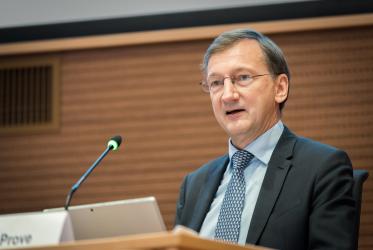At the International Inter-religious Conference in The Hague, Netherlands on 10 December 2008 WCC general secretary Rev. Dr Samuel Kobia was one among ten religious leaders from the different world religions who signed a statement entitled Faith in Human Rights in the presence of a large gathering of national and international dignitaries and human rights activists.
By adding my signature to this Statement I affirm the basic values and principles inherent in the Universal Declaration of Human Rights even as I reiterate that human rights are a matter of faith.
- The adoption of the Universal Declaration of Human Rights (UDHR) in the aftermath of the Second World War was a decisive milestone with regard to the protection and promotion of human dignity, human rights and fundamental freedoms. This Declaration finds its roots in the strong desire for peace of the Member States of the United Nations, and has been commonly adopted despite their differences in ideologies, political systems, religious and cultural backgrounds.
- In its Preamble, the Declaration starts by recognising that the "inherent dignity of all members of the human family is the foundation of freedom, justice and peace in the world" and links human dignity to the recognition of fundamental rights towards which every human being aspires: the right to life, liberty and security of individuals; the right to seek and to enjoy in other countries asylum from persecution; the right to freedom of opinion and expression; the right to freedom from torture and degrading treatment; etc. to name only a few. Sixty years after its adoption, the Declaration still remains the Magna Carta for all humanity and has created a benchmark for state conduct at national and international levels, and helps us realise our shared vision of a religiously and culturally diverse world community striving together to promote and defend the rights and dignity of all.
- The primary responsibility to promote and protect human rights belongs to States. In addition, States have duties to the wider communities to which they belong, and bear the responsibility to promote and proclaim the universality of human rights. Today, thousands of innocent people die, face hardship and are victims of ill-treatment due to mere violations of their basic human rights, thus making the enjoyment of basic human rights a mirage for many.
- The Declaration is by no means a 'pick-and-choose' list: it is a document that should be accepted comprehensively. There is an urgent need for a thorough reflection on the acceptance of each right as an integral part of the whole. The rights, freedoms and obligations laid down in the Declaration are universal, indivisible and interdependent and interrelated. Despite the national and regional particularities, as well as historical, cultural and religious backgrounds of many, arguments regarding the cultural relativity of human rights should not be encouraged. Rather, a dynamic interpretation of human rights should be welcomed, and ought to highlight States' duty in the promotion and protection of all human rights and fundamental freedoms.
- In these times when many in the world are fascinated by violence and its various forms, we - religious leaders - should relentlessly promote peaceful means to redress and refrain from the use of violence. With regard to the increase in religious intolerance, and without denying the importance of the freedom of expression, special sensitivity and respect should be shown to the portrayal of objects of religious veneration.
- As religious leaders, our role is to study carefully our respective holy scriptures and teachings so as to find grounds for theological rationale in defence of human rights. We need to address situations where harm has been done in the name of religion, promote forgiveness, reconciliation and healing in order to foster mutual respect and understanding among our communities, and stimulate interfaith co-operation with mutual respect.
In conclusion, I wish to underline the World Council of Churches' deep commitment to continue to uphold, promote and advocate for human rights and human dignity for all, and towards that end to seek cooperation with leaders of other faiths.
Samuel Kobia
General secretary
World Council of Churches


